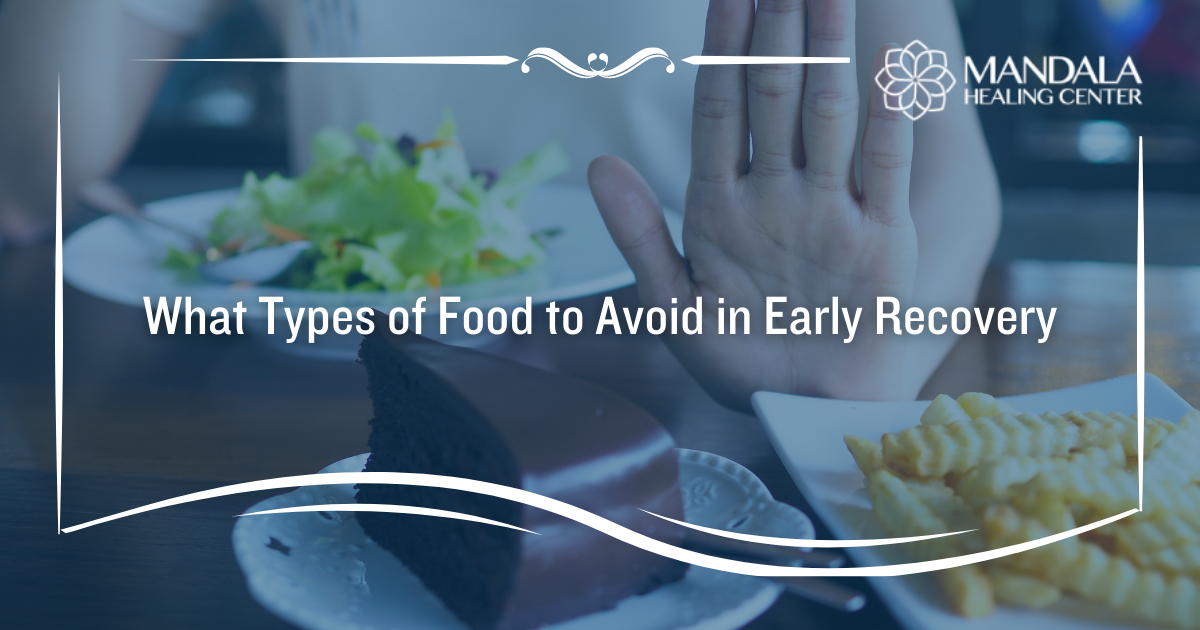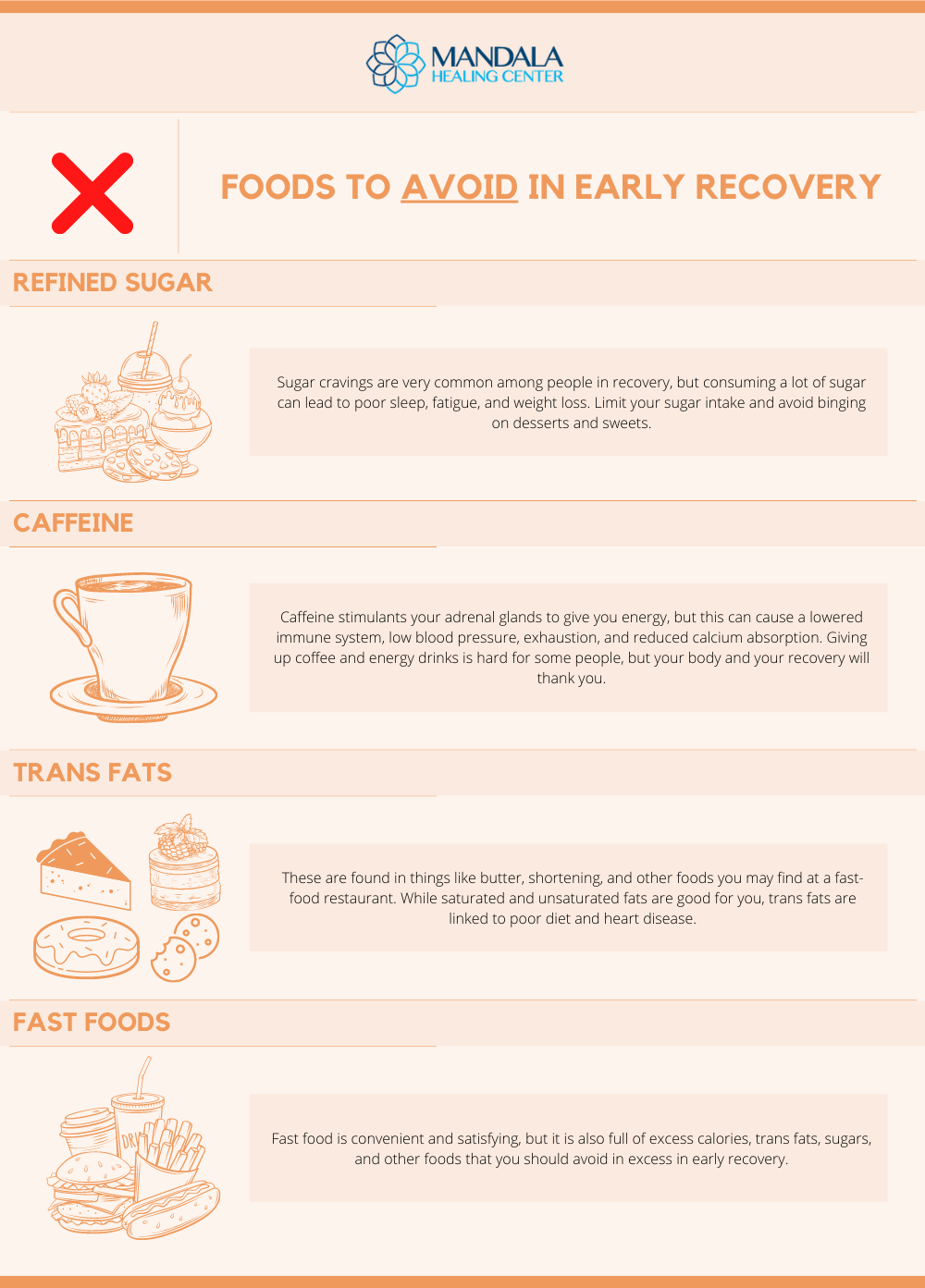Early recovery can be a challenging time because your body is healing and your mind is adjusting to no longer being addicted to drugs or alcohol. While you may no longer be physically dependent on substances, you may still experience cravings, mood swings, depression, anxiety, sleep disturbances, low energy levels, and more. There are many external and internal factors that affect your mood and overall well-being in early recovery, but one of the major ones is nutrition.
Whether you’re about to go to rehab or are already sober, it’s important to understand the role of nutrition in sobriety and what types of foods you should avoid in early recovery. You may be surprised how your recovery changes when you make small changes in your diet to support a healthier lifestyle.
The Role of Nutrition in Addiction Recovery
Drug and alcohol dependence change the body in a variety of ways. Depending on the type of substance abused, a person may eat less or more than they should, failing to meet the appropriate caloric intake each day. At the same time, substance abuse usually causes other negative lifestyle changes, as well. People who are addicted may eat irregularly or consume a poor diet. It is not uncommon for people to enter substance abuse treatment with malnutrition, nutrient deficiency, and even eating disorders.[1]
Getting sober, on the other hand, also affects the body in various ways. When you get sober, your metabolism will change, organs will begin to heal, and you will experience more mental clarity.
Consuming a balanced, nutritious diet can help speed up this healing process because your body needs the right kinds of nutrients to produce energy. You also need a healthy diet to support immune function and organ health. Lastly, the types of foods you consume in early recovery can influence your mood. When you eat healthily, you feel healthy–both mentally and physically.[2]
Food to Avoid in Early Recovery
Anything can be enjoyed in moderation, but it’s important not to rely on food to make you feel better. So-called “comfort foods” may satisfy a temporary craving and make you feel good at the moment, but not all foods support a healthy lifestyle. Here is a list of food you should avoid (or enjoy in moderation) in early recovery.
- Refined sugar – Sugar cravings are very common among people in recovery, but consuming a lot of sugar can lead to poor sleep, fatigue, and weight loss. Limit your sugar intake and avoid binging on desserts and sweets.
- Caffeine – Caffeine stimulants your adrenal glands to give you energy, but this can cause a lowered immune system, low blood pressure, exhaustion, and reduced calcium absorption. Giving up coffee and energy drinks is hard for some people, but your body and your recovery will thank you.
- Trans fats – These are found in things like butter, shortening, and other foods you may find at a fast-food restaurant. While saturated and unsaturated fats are good for you, trans fats are linked to poor diet and heart disease.[3]
- Fast food – Fast food is convenient and satisfying, but it is also full of excess calories, trans fats, sugars, and other foods that you should avoid in excess in early recovery.
It’s important to remember that everyone has their own unique dietary needs. You should never completely cut a food group out of your diet or restrict your calories without speaking to your doctor.
Nutritious Food You Should Be Eating, Instead
A balanced, nutritious diet will fuel your mind, body, and recovery. Some general guidelines to follow when planning your meals are:
- Eat your meals at the same time each day
- Focus on eating protein, complex carbohydrates, and fiber
- Replace sugary snacks with fresh fruits and vegetables
- Cook at home rather than picking up fast food
- Drink plenty of water and avoid sugary drinks
- Speak to your doctor about vitamin and mineral supplements that you may benefit from, such as B-complex, Vitamin A, Vitamin C, magnesium, and zinc
If you’re trying to make healthy diet choices in early recovery, consider replacing some of the foods you should avoid with these types of food, instead.
- Lean protein like chicken and ground turkey
- Complex carbohydrates such as beans, lentils, quinoa, brown rice, and oats
- Root vegetables like potatoes and carrots
- Calcium-rich products like cheese, kale, tofu, and dairy products
- Leafy green vegetables such as spinach
- Healthy fats found in nuts, avocado, and fish
Eating these kinds of foods can help support your mood, energy, sleep schedule, and so much more.
Nutritional Support at Mandala Healing Center
Total healing begins from the inside, which is why proper nutrition is essential for every individual in recovery. Here at Mandala Healing Center, our holistic approach incorporates nutritional support into each patients’ treatment plan.
Our dietician evaluates each new patient at the point of his or her particular phase of recovery. Nutritional re-evaluations are then held at Mandala on an ongoing basis. These private sessions are designed to be collaborative and empowering with an emphasis on instilling healthful, life-long eating habits. Additionally, patients may participate in special group sessions and fun, hands-on cooking classes where they are taught the valuable life skill of learning to prepare their own healthy foods.
Whether you have an unhealthy relationship with food that needs mending or you need guidance to create a balanced diet, our team can help. Call now to find out if our addiction treatment program in West Palm Beach is right for you.
References:













